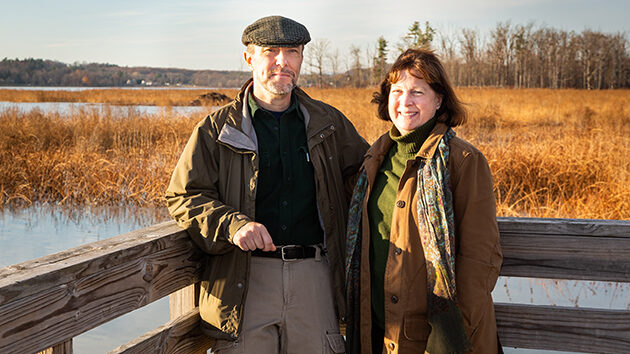Full Orchestra of Caregivers Save Saratoga Park Ranger

The pain seemed to come out of nowhere and, for the life of him, Bill Valosin couldn’t pinpoint what was causing it.
In the spring of 2019, Valosin, a park ranger for the Saratoga National Historical Park, began to experience intense migraines. Pain medication offered no help. Nor did urgent care visits. When he began to slip in and out of consciousness, his wife, Chris, rushed him to the Emergency Department at Saratoga Hospital.
“They did a workup and they knew right away how serious my condition was,” Valosin said. “They told me I had a serious brain infection and they needed to get me to Albany Med immediately.’”
By the time the ambulance arrived, neurosurgeon Maria Peris-Celda, MD, PhD, was preparing for emergency surgery.
Chris Valosin remembers taking an elevator up from the Emergency Department and, due to the intense race against time, meeting Dr. Peris-Celda in a hallway, who described the severity of Bill’s case. She would later tell the couple it was the worst intercranial infection she had ever seen.
“I shed a number of tears, at this point,” Chris Valosin said. “Still. You forge ahead without knowing everything. You’re dealing with the shock and enormity of it all, but you keep moving forward.”
Because of the extensive swelling in his brain, Dr. Peris-Celda performed a craniectomy, clearing the infection and removing a portion of Valosin’s skull that would be replaced later, after it was certain the infection had been eradicated and all the swelling was gone.
Craniectomy patients usually benefit from intensive rehabilitation and often wait several months before their removed bone is replaced—either with the original bone flap or a custom contoured graft if their bone was compromised, as was the case with Valosin.
He remembers very little from this period, including his stay in the Neurosurgical Intensive Care Unit, but his wife’s memories of the unit’s staff are crystalline. Anatoly Sosnovsky, RN, BSN, was one of many caregivers at Albany Med whose support, she said, she will never forget. “He was a real truth-teller and, at the same time, very comforting. I remember when he told us he wanted us to come back and see him once Bill was better. It gave me the feeling that everything might work out OK.”
As he regained more cognizance, Valosin moved to the Physical Medicine and Rehabilitation unit where caregiving teams worked in tandem with physical, occupational and speech therapists to initiate his rehabilitation. “It was hard work, but I was in excellent hands,” he said. He remembers watching the staff spring into action on a day when he began to exhibit stroke-like symptoms. “They hit a button for the stroke team who arrived and there was seamless communication between everyone in the room.”
It was illustrative, he said, of the teamwork and coordinated approach to care that marked his stay at Albany Med. “We would meet people for the first time who were already fully aware of the details of my case,” he said. Specialists from many disciplines were weighing in—neurosurgery, infectious disease, anesthesia, rehabilitation, orthopedics, cardiology, neurology—and they all worked i n concert with one another.
Chris Valosin said she took comfort from them all. And she has a message for anyone facing a complex health challenge like her husband’s: “Don’t give up. It’s hard to go through something like this. An event like this changes your life, yes, but it doesn’t diminish it. Try to keep looking at what you’re grateful for.”
After a 45-day stay at the Medical Center, Valosin went home and continued working on his rehabilitation. He returned to Albany Med three months later for a final surgery with Dr. Peris-Celda, who placed a synthetic bone flap in the recovered area.
She explained that brain infections sometimes occur when bacteria or fungi make their way into the brain, either through the bloodstream or from an infected area in the head. After extensive investigation, a definitive source for Valosin’s severe infection still remains unclear.
What is very evident are the spirit and determination he has shown as he’s made his recovery.
Today, more than a year later, he continues to mark his progress, which has been steady and strong. He is telecommuting, enjoying the great outdoors, and he and Chris recently celebrated their 12th anniversary. “Last year we marked the occasion in the post-anesthesia care unit, following my final brain surgery,” he said. “This year we went to a restaurant overlooking Saratoga Lake.”